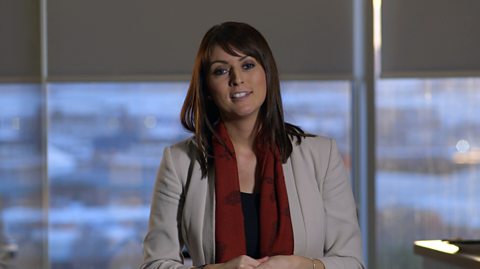NARRATOR:'High-tech engineer, dental nurse, hairdresser. An apprenticeship can be a great way to get yourself skilled up without going to uni, and earn some hard cash while you're training.'
NARRATOR:'There are currently over 1,500 types of job you can do as an apprentice. To find out more, we got together six school students. Each will discover what it's like to be an apprentice for a day.'
NARRATOR:'Here's Ellie's story.'
ELLIE:Hi, I'm Ellie, I'm 15 years old and I'm currently doing my GCSEs. My favourite subjects are food tech and art, but, most of all, I enjoy baking.
ELLIE:Last year, we did a competition called the Future Chef competition, and my school entered our class into it and I won my school heat for that, and then we got into the North-West Finals. It was really exciting. I think I learnt a lot from it.
ELLIE:Mum, come and taste my cheesecake. When I cook something and then everyone enjoys it, it makes it feel worthwhile.
MUM:Mmm, very nice, Ellie, it tastes lovely.
ELLIE:I don't really know much about apprenticeships, but I'd like to find out more about them.
NARRATOR:'Ellie and the other would-be apprentices meet someone who knows plenty about jobs and how to choose the right one.'
AIMEE:You can have apprenticeships from hairdressing, to nuclear scientists, there are a wide range of career options.
ELLIE:So would you say you get a decent wage working as apprentice?
AIMEE:The average apprenticeship per week, pays ÂŁ170, okay? And actually over your career, an apprentice skill can earn you more than ÂŁ100,000 more over your whole career.
AIMEE:Before even thinking about what apprenticeship you should take, I think it's really important that you guys start thinking about what you're good at. What's most important is you enjoy what you do because if you are happy, then you will be successful.
NARRATOR:'Ellie has an in-depth session with careers mentor Aimee.'
AIMEE:OK, so, Ellie, have you got an idea of what it is you'd like to do in your career?
ELLIE:Like involved with cooking and baking.
AIMEE:Cooking?
ELLIE:Yeah, like the creative side of it.
AIMEE:OK.
ELLIE:When I took it in GCSEs at school, it got me really interested in it.
AIMEE:Would you say that was a real passion?
ELLIE:Yeah, the creative side of it.
AIMEE:And what about the academic side of things? Is that something that you enjoy?
ELLIE:I mostly enjoy more like art and food technology, instead of like science and maths.
AIMEE:So it's fair to say that you're a more practical learner, a doer. You want to get out there and do?
ELLIE:Yeah.
AIMEE:So as part of your journey and your decision about this apprenticeship, how about we spend the day with one of the UK's leading chefs?
ELLIE:Yeah, that would be really good.
NARRATOR:'First step, Ellie needs to look the part.'
ELLIE:Let's go.
NARRATOR:'Top British Chef, Michael Caines, has two Michelin stars, and runs some of the country's finest restaurants. He's employed dozens of apprentices. One them is 18-year-old pastry chef Aidan.'
MICHAEL:Go on, Aidan. In you go. That's it, perfect. That's it. Excellent.
NARRATOR:'He's on a two-year apprenticeship and is ready to show Ellie how things work in a professional kitchen.'
ELLIE:Hi, I'm Ellie.
AIDENWonderful, do you want to start to come over here?
AIDEN:OK, Ellie, so today we're just going to make some macaroons. Have you ever made any before?
ELLIE:No.
AIDEN:No, okay wonderful.
ELLIE:So how did you get in to being an apprentice?
AIDEN:From school, I started working on weekends at a local restaurant, which gave me good experience in working in a professional kitchen. And then after that, working for two years and weekends, I applied to do my NVQ2 at college, through Michael Caines' apprenticeship.
NARRATOR:'Good GCSE grades helped Aidan get the apprenticeship.'
AIDEN:So when I first started, I specialised in the pastry section so, you know, making the bread and doing preparation for lunch service.
NARRTOR:'From making the bread, Aidan quickly progressed to creating elaborate desserts.'
AIDEN:The pastry section is quite different to the main kitchen. You've got to be exact with your measurements and all that, because if you don't have precise measurements, the recipe won't work.
ELLIE:So you look like you really enjoy your job, would you say there's any downsides?
AIDEN:The disadvantage is obviously the unsociable hours, but that's what comes with the job.
ELLIE:So what are the advantages of doing an apprenticeship rather than just going to college?
AIDEN:At college, you're being taught by one teacher and say about 20 students. But the advantage of being in an apprenticeship in a workplace, you're the one studentbeing taught by 20 chefs, so you get all their knowledge for yourself.
ELLIE:So do you think it's good to be earning money while you're training?
AIDEN:Yeah, definitely so. It's always nice to have a bit of money just to do what you want with.
NARRATOR:'And Aidan has some clever tips about how to get noticed as an apprentice.'
AIDEN:On your days off, you can always get your cookery books, start making your own things and then go into work and show them, showing that you're learning. They love that. It's all about learning. What you put in, you'll get out basically.
NARRATOR:'There's a lot of competition for good apprenticeship places. Some employers will train you in basic skills, but most will want to see decent GCSE grades, or equivalent qualifications. And for higher apprenticeships, you'll require A-Level or equivalent qualifications.'
NARRATOR:'With roughly ten applicants for every apprenticeship you really have to stand out, to stand a chance of getting in.'
MICHAEL:Within our apprenticeship programme, we're looking for bright, young individuals that want to engage with the hospitality industry, and within our company and progress. And we offer lots of progression for those individuals.
MICHAEL:I think somebody like you, Ellie, is a really good candidate because you've shown that you're interested, you've taken part with the competition, you've also done work experience, which is really all very, very positive when you go to an employer like myself.
ELLIE:Would you recommend a career as a chef?
MICHAEL:If I can't recommend a career in cooking, then nobody can. I think it's a great industry that Britain can be proud of, along with fashion and all the other wonderful things we are exporting.
MICHAEL:One of the things that makes Britain very special, is our multiculturalism. The fact that we have influence from all around the world within our culture, within our society and that's reflecting on our cuisine.
MICHAEL:And that identity that we have about being British is something people want to buy into, as well as us being able to export, along with all the other great things in the UK.
ELLIE:I've really enjoyed myself today, I found it really fun. Also, in the kitchen, it was more relaxed than I thought it would be. But most importantly, I realise I can use my creative side when working. I think it would be really good for me.
Video summary
15 year-old Ellie tries out being an apprentice chef for a day.
Ellie gets some helpful advice about how to choose a career from a leading careers mentor, Aimee Bateman.
Ellie finds out what employers are looking for from one of Britain’s top chefs, the two Michelin-starred, Michael Caines.
Ellie also shadows 18 year-old Aidan Robinson and speaks to him about his job as an apprentice pastry chef and what the training involves with Michael’s successful restaurant group.
An apprenticeship can be a terrific way into a job, to earn while you learn and can offer a real alternative to University for many young people.
With school students now having to stay in full time education or training until the age of 18, this clip provides plenty of useful advice to those who may benefit from a vocational education setting.
This is from the series: Apprentice for a Day
Teacher Notes
Careers and PSHE staff can discuss what pupils need to know about apprenticeships, e.g. what they are, what employers are looking for, how to find out if an apprenticeship would suit them.
They can discuss with pupils how to weigh up the pros and cons of choosing an apprenticeship over other career pathways.
The clip shows that pupils need to actively choose and manage their careers, e.g. by asking questions and planning ahead.
They can come up with a list of questions to ask a careers adviser, an apprentice and an employer about apprenticeships in the sectors that interest them.
Pupils can research apprenticeship vacancies and other useful information on the National Apprenticeship Service website at and sites such as .
They can look at information about different types of jobs on the National Careers Service website at .
For specialist advice and information, they can contact the careers adviser in their own school.
This clip will be relevant for teaching Business and PSHE Citizenship at Key Stage 3 and Key Stage 4/GCSE, in England and Wales and Northern Ireland.
Also at 3rd and 4th Level in Scotland.
Apprentice dental nurse for a day. video
17 year old Josh tries out being an apprentice dental nurse for a day.
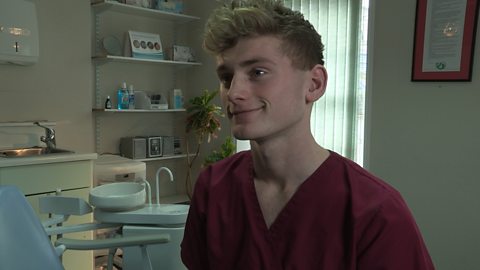
Apprentice engineer for a day. video
17 year old Lewis tries out being an apprentice engineer for a day.
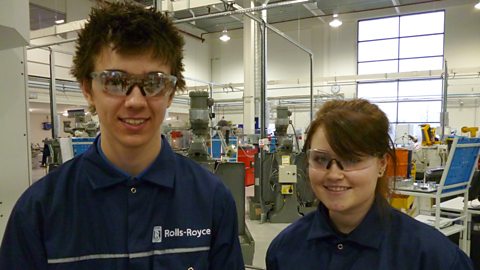
Apprentice hairdresser for a day. video
14 year old Beth tries out being an apprentice hairdresser for a day.
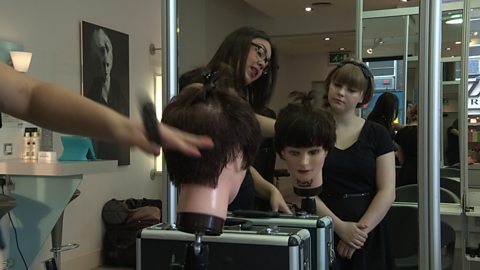
Apprentice outdoor education tutor for a day. video
15 year old Evie tries being an apprentice outdoor education tutor for a day.
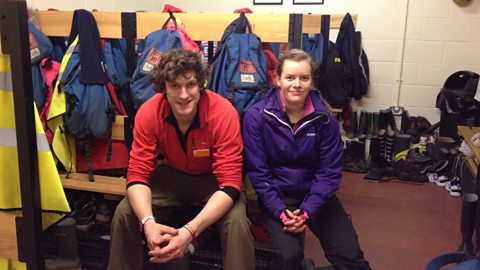
Apprentice plumber for a day. video
15 year old Courtney tries out being an apprentice plumber for a day.
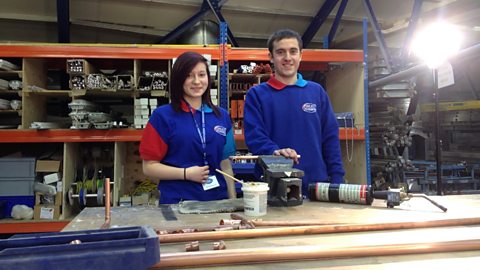
How to prepare a CV and perform in a job interview. video
Advice from careers mentor Aimee Bateman on how to create an amazing CV and cover letter plus job interview tips.
